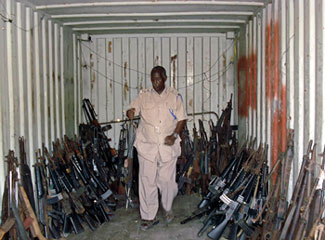
UNITED NATIONS (FinalCall.com) – “The abuse of small arms has caused untold distress, and the United Nations must lead the process to stem their proliferation,” stated Ghana’s President John Agyekum Kufuor at the opening of the UN General Assembly debate on Sept. 25.
“As Africa had continued to make significant progress toward healing the wounds of long wars that had plagued regions of the continent, the trade of small arms and light weapons had wrought havoc on millions of people and fueled insecurity and instability,” said Pres. Kufor who also serves as chairman for the African Union for 2007.
President Branko Crvenkovski of the former Yugoslav Republic of Macedonia also called on the General Assembly to place disarmament, arms control and non-proliferation high on its agenda.
A week after the two leaders addressed their fellow world leaders, a report was circulated to the media in Washington, D.C. from the nonpartisan Congressional Research Committee titled “Conventional Arms Transfers to Developing Nations.”
The report noted that the United States “maintained its role as the leading supplier of weapons to the developing world in 2006 followed by Russia and Britain. Pakistan, India and Saudi Arabia were the biggest purchasers. Ironically, the three top arms dealing nations are also permanent members of the Security Council with veto power.
Pakistan had agreements to purchase $5.1 billion in arms in 2006. India was second with $3.5 billion and Saudi Arabia third with $3.2 billion in deals, according to the report. “The global arms market is highly competitive, with manufacturing nations seeking both to increase profits and to expand political influence through weapons sales to developing nations, which reached $28.8 billion,” stated The New York Times story covering the report.
The report shows that over 70 percent of global arms sales agreements were with developing nations. Arms control specialists say the figures underscore how largely unchecked arms trade to the developing world has become a major staple of the American weapons industry,” states the Global Policy Forum, a New York-based UN-watchdog organization.
“At least on the declaratory level, Bush administration policy asserts that preferred arms customers are U.S. allies in the war on terror; likewise, it has criticized Russia for sales to Iran and Venezuela,” writes Frida Berrigan and William D. Hartung of The Arms and Security Inititative, New America Foundation.
There is beginning to be a cool breeze in the arms transfer arena that feels like the possible beginnings of a new Cold War, Ms. Berrigan and Mr. Hartung write, suggesting that there is more of an economic issue in play in America then the national security posture in play again between the U.S. and Russia during the Cold War of the 1960s. However, Ms. Berrigan in the past has said that there is a danger of a serious worldwide arms race. “Yet again, the Bush administration is failing to fully take into account the long-term implications of its actions,” Ms. Berrigan stressed.
“The only winner from these deals are the U.S. weapons contractors,” Natalie J. Goldring, a senior fellow with the Center for Peace and Security Studies at Georgetown University’s School of Foreign Service told the Inter Press Service. “For the U.S. Defense industry, this is Christmas,” she said.
According to analysts, while it may be “Christmas” for companies such as Lockheed Martin, with contracts totaling $26.6 billion, it is not a party on the ground in places such as the Horn of Africa and East Africa.
“Despite the failure of U.S. policies in those regions, the current administration continues to respond to Africa’s woes by helping to strengthen African militaries,” states a report from the World Policy Institute.
William Church, director of the Great Lakes Centre for Strategic Studies, a London-based think tank, stated that direct arms sales to East Africa and the Horn of Africa nations–Djibouti, Eritrea, Ethiopia, Kenya, Rwanda, Uganda and Zambia–have increased from under one million dollars in 2003 to over $25 million in 2006. “Djibouti leads the list with nearly $20 million in direct arms purchases in 2005 and 2006,” writes Mr. Church in his piece for www.americanchronicle.com.
Overall, direct U.S. weapons sales increased from $39.2 million in 2005 to nearly $60 million in 2006, states a report on www.friendsofethiopia.blogspot.com. “East Africa and the Horn accounted for nearly 40 percent of U.S. weapons sales to Africa,” states the website story.
Mr. Church notes that Ethiopia “shows a dramatic increase in arms purchases” with eight million dollars of weaponry being purchased from the U.S. in 2006, and an estimated amount of five million dollars worth of purchases in 2007 on order.
Mr. Church reports: “Although there are indications that U.S. arms sales to Africa may be drastically reduced in 2007, this appears highly unlikely considering the increased fighting in Somalia and an unstable situation in Sudan. If the Sudan government is destabilized over the international confrontation in Darfur, the repercussions for the region, and the Sudan, will be drastic and fuel an increased influx of weapons to the region.”
Back at the UN, a meeting held on October 26, 2006 showed Washington’s “desire to maintain the status quo” on arms dealing, according to the Global Policy Forum (GPF). The UN Disarmament and International Security Committee voted to regulate the sale of conventional arms, while the U.S. was the only nation out of 166 to vote “no.” China, Russia and a small number of other countries abstained. And despite the “no” vote from the U.S., Britain’s proposal to draw up uniform standards that might block arms sales considered destabilizing, including those that might fuel ongoing conflicts, violates embargoes, undermine democratic institutions, or contribute to human rights abuses, passed.
A General Assembly task force is set to make its recommendations before December, but the powerful interests in the global arms industry are ready to stand in the way of anyone controlling the arms flow to the developing world, states GPF.












